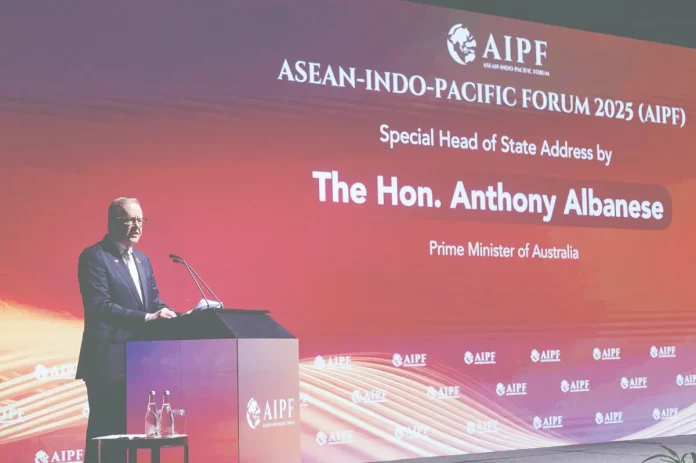KUALA LUMPUR: The idea of an Asean Business Entity (ABE), in a rapidly evolving regional landscape, is emerging as a forward-looking vision for the next phase of economic integration.
Spearheaded by Malaysia and elevated under Budget 2026, the proposal seeks to enable greater mobility and collaboration across borders – not through political reform, but through pragmatic corporate innovation.
“We cannot politically have free movement of people or corporations across Asean – it’s just not feasible right now. But what we can do is make it possible at the company level,” Asean-BAC Malaysia chair and founding partner of Ikhlas Capital Tan Sri Nazir Razak told delegates at the Asean Indo-Pacific Forum 2025 today.
Building on the groundwork laid during Indonesia’s 2023 chairmanship, Malaysia has placed the ABE concept “front and centre of our agenda”.
Nazir also highlighted the government’s strong commitment to institutionalise this initiative.
The vision is simple yet transformative: companies recognised as ABE could enjoy more unrestricted movement of talent, capital, and operations within the region, unlocking a new model of integration suited to the Indo-Pacific era.
“If you imagine under an ABE, once recognised, you can have free movement of people. You can outsource operations. It is a practical pathway towards the economic unity we have always aspired to,” he said.
Nazir elaborated that the concept of the ABE could extend well beyond regional borders, even finding relevance within the broader Indo-Pacific framework. “This idea is not limited to Asean. It can also be extended to the Indo-Pacific platform, where the same principle applies – integration through corporate channels rather than political ones.”
The system would remain regulated, ensuring national sovereignty is respected, Nazir said.
“Of course, if you are just a normal worker, the usual visa rules apply. But for recognised entities, this gives real substance to the idea that we are, in effect, one economy,” he added.
Nazir noted that while Asean is often portrayed as a unified market of 700 million people, the reality for many investors is quite different.
“A lot of foreign investors come to Malaysia or Asean and say, ‘You told me this was a market of 700 million people. But when I arrive, it is so fragmented, it is difficult to move goods, and even harder to move people’,” he said.
That, he explained, is precisely why Malaysia has championed the ABE concept – a practical way to bridge those gaps at the company level rather than through complex political reforms.
“I thought, why can’t we start this at least at the company level? And that’s exactly what Malaysia has done,” he said.
Nazir shared that the idea has already gained international attention. “I had the opportunity of discussing this concept with the International Monetary Fund (IMF) managing director Kristalina Georgieva, and she found it relevant not only for Asean but for regional platforms around the world.”
The IMF has agreed to conduct a study on the ABE concept, though Nazir stressed that the idea is simple enough to move forward without delay.
“We don’t need to wait for that study. What is important now is to act. I truly hope the Asean-Indo-Pacific Task Force can consider that ABE should stand for Asean Indo-Pacific Business Entity – because if we can achieve that, it would be a meaningful outcome from this conference,” he said.
In his special head-of-state address, Australian Prime Minister Anthony Albanese said in the spirit of Asean’s long-standing tradition of cooperation, leaders gather here with a shared purpose – to deepen partnerships for mutual prosperity.
“The true strength and resilience of our economies, as Nazir Razak highlighted, do not come from turning inwards but from looking outwards.
“The best way to enhance the security and resilience of our economies is to deepen and diversify our trade ties, strengthen economic cooperation, and build closer bonds between our citizens,” Albanese said.
He emphasised that such progress cannot be achieved through agreements or declarations alone.
“Real advancement is measured not in the documents we sign, but in acts of practical partnerships — in new businesses being established, new energy and infrastructure projects taking shape, new investments in manufacturing, and in the friendships we build through education and cultural exchange,“ Albanese said.
It is through these tangible actions that Asean’s collective growth and unity will continue to flourish, he added.
Albanese said as a pro-trading nation with an outward-looking economy, Australia stands ready to play its part in shaping this transformation and embracing the opportunities that lie ahead.
He noted that this year marks the 70th anniversary of Australia’s diplomatic relationship with Malaysia, a milestone that reflects the depth of trust and cooperation built over generations.
Albanese said that over the past seven decades, both nations and the broader region have undergone extraordinary change, reshaping not only economies but also perspectives. These shifts, in turn, have transformed how Australia views its role in the region.
“For much of its modern history, Australia considered itself constrained by the ‘tyranny of distance,‘ its prosperity tied to markets far away – in the United Kingdom, Europe, and the US. Today, that outlook has evolved as Australia embraces its place within a dynamic, interconnected Indo-Pacific community,“ he said.








